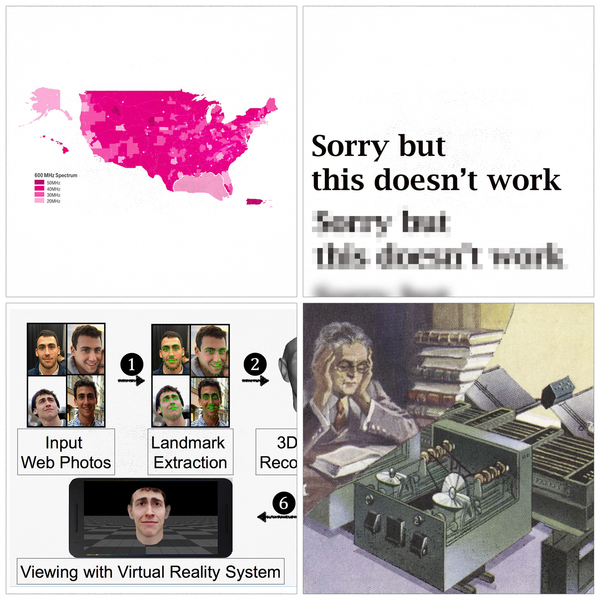Open.gov Calls BS on 30 Year Old Whopper AI

The various facets of artificial intelligence, history of telecommunication, how political views are affected by internet access, and how to spot BS effectively. Lyle, Brian, and Miles discuss all this and more in the week’s news.
Followup: Video published - Calling Bull•••• in the Age of Big Data
During the 1/18/2017 Episode we talked about a class at The University of Washington: “Calling Bull•••• in the Age of Big Data”. The lectures have begun. As of April 15th several videos of the lectures have been posted to the class’s youtube channel. The info and thought process should be required education for – everyone.
Yes, the full title is the long form of B.S. What is B.S.? The professors define it as:
B.S. involves language, statistical figures, data graphics, and other forms of presentation intended to impress, overwhelm, or persuade – presented with a blatant disregard for the truth, logical coherence, or what information is actually being conveyed.
T-Mobile dominates spectrum auction
T-Mobile USA was the biggest winner in an auction that shifted licenses in the 600MHz spectrum band from TV broadcasters to the cellular industry. T-Mobile will pay $7.99 billion for 1,525 licenses spread throughout the country, according to the results announced today. T-Mobile boasted in a press release that it won 45 percent of the spectrum in the auction, amounting to “31MHz nationwide on average, quadrupling the Un-carrier’s low-band holdings.”
Cell Phones 30 Years Old
This is the first cellphone. It went on sale 30 years ago today for $4,000
FCC Chairman to End Plans to Allow In-Flight Cellphone Calls
In a statement [PDF], Pai called the FCC’s plan “ill-conceived” and said that tabling it permanently would be a “victory for Americans across the country.”
‘Nobody’s got to use the Internet’: A GOP lawmaker’s response to concerns about Web privacy
A Wisconsin congressman told a town hall attendee who was concerned about the elimination of online privacy protections that using the Internet is a choice — a statement that has since drawn criticism on social media.
Is the Internet Causing Political Polarization? Evidence from Demographics
We combine nine previously proposed measures to construct an index of political polarization among US adults. We find that the growth in polarization in recent years is largest for the demographic groups least likely to use the internet and social media. For example, our overall index and eight of the nine individual measures show greater increases for those older than 75 than for those aged 18–39. These facts argue against the hypothesis that the internet is a primary driver of rising political polarization.
Trump Administration Kills Open.Gov, Will Not Release White House Visitor Logs
It will never be said that the Trump presidency began with a presumption of openness. His pre-election refusal to release his tax returns set a bit of precedent in that regard. The immediate post-election muffling of government agency social media accounts made the administration’s opacity goals… um… clearer.
So, in an unsurprising move, the Trump administration will be doing the opposite of the Obama administration. The American public will no longer have the privilege of keeping tabs on White House visitors.
AI Literacy: The basics of machine learning
While the answers won’t be too technical, I will try to make them precise, because there’s a lot of room between highly mathematical explanations and hand-wavy “the robots are coming to take our jobs” stuff. I’m also increasingly of the opinion that a cocktail-party-level understanding of AI is both important and achievable.
Burger King thought it had a great idea. Instead, it ended up with a Whopper of a problem.
The ad, released Wednesday, features an actor dressed as a Burger King employee, who says, “Okay, Google: What is the Whopper burger?” The line is meant to trigger the device to reel off the definition of a Whopper using the first line of the burger’s Wikipedia page.
Um, bad news: Pixelating or blurring doesn't actually work to hide text
We conclude that hidden Markov models allow near-perfect recovery of text redacted by mosaicing or blurring for many common fonts and parameter settings, and that mosaicing and blurring are not effective choices for textual document redaction
Hackers Trick Facial-Recognition Logins With Photos From Facebook (What Else?)
The researchers instead went about collecting images of the 20 volunteers the way any Google stalker might—through image search engines, professional photos, and publicly available assets on social networks like Facebook, LinkedIn, and Google+. They found anywhere from three to 27 photos of each volunteer.
Price points out that many of the study participants are computer science researchers themselves, and some make an active effort to protect their privacy online. Still, the group was able to find at least three photos of each of them.
Optical illusions that trick, fool, and flummox computers
To a human, a fooling image might look like a random tie-dye pattern or a burst of TV static, but show it to an AI image classifier and it’ll say with confidence: “Yep, that’s a gibbon,” or “My, what a shiny red motorbike.” Just as with the facial recognition system that was fooled by the psychedelic glasses, the classifier picks up visual features of the image that are so distorted a human would never recognize them.
LiquidText iPad App - Active Reading.
LiquidText gives you the tools you need to develop a deeper understanding of the things you read. With our gesture based reading software you can review, analyze, and react to text in ways not possible on paper.
This is the rare iPad app that demonstrates how a serious productivity app can be built that improves on both ‘meat space’ (real life?) and desktop software. This is really revolutionary – and really buggy. But, the promise of it is so good I want to support it and see it reach its full potential.
e13s17

